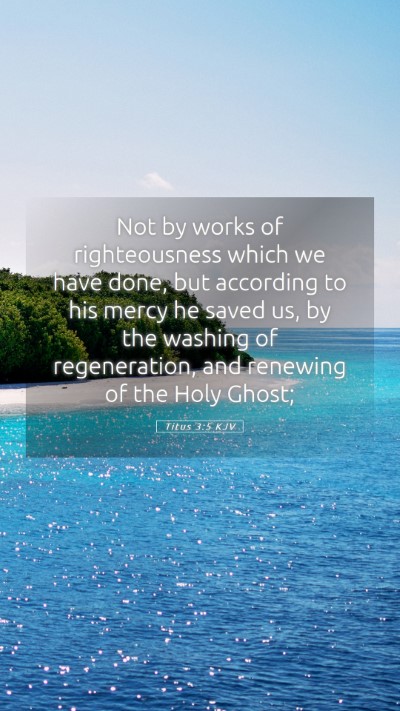Old Testament
Genesis Exodus Leviticus Numbers Deuteronomy Joshua Judges Ruth 1 Samuel 2 Samuel 1 Kings 2 Kings 1 Chronicles 2 Chronicles Ezra Nehemiah Esther Job Psalms Proverbs Ecclesiastes Song of Solomon Isaiah Jeremiah Lamentations Ezekiel Daniel Hosea Joel Amos Obadiah Jonah Micah Nahum Habakkuk Zephaniah Haggai Zechariah MalachiTitus 3:5 Meaning
What is the meaning of Titus 3:5?
Not by works of righteousness which we have done, but according to his mercy he saved us, by the washing of regeneration, and renewing of the Holy Ghost;
Titus 3:5 Bible Verse Meaning
Bible Verse Meaning: Titus 3:5
Titus 3:5 states: "Not by works of righteousness which we have done, but according to his mercy he saved us, by the washing of regeneration, and renewing of the Holy Ghost;". This verse encapsulates a powerful message regarding salvation and the nature of God's mercy.
Overall Interpretation
In Titus 3:5, Paul emphasizes that salvation is not something we earn through our good deeds, but rather it is a gift of God's grace. The verse can be broken down into key components that together highlight the essence of Christian doctrine regarding redemption.
Key Insights from Public Domain Commentaries
-
Matthew Henry:
Henry notes that the means of our salvation are entirely rooted in God's mercy, underlining that human efforts are insufficient for gaining eternal life. He emphasizes the transformative aspect of salvation as a "washing of regeneration," signifying a spiritual rebirth initiated by the Holy Spirit.
-
Albert Barnes:
Barnes elaborates on the idea of renewal through the Holy Spirit, stressing that believers are not only saved from sin but are also endowed with new life through divine intervention. He ties this renewal to the profound changes happening within the believer's soul upon receiving God's grace.
-
Adam Clarke:
Clarke provides a detailed exposition on the terms "washing of regeneration." He suggests that this phrase refers to baptism as a symbolic representation of cleansing and the new birth. Clarke reinforces that it is God's mercy, not human merit, that brings about salvation.
Understanding Salvation through Grace
The central theme of Titus 3:5 is the doctrine of salvation by grace. Here, we see several critical points:
- Not by Works: The phrase "not by works of righteousness" underscores that human efforts are irrelevant to achieving salvation. This is a recurring theme in scripture, reminding believers that their salvation rests solely on God's goodness.
- God's Mercy: The emphasis on "according to his mercy" speaks to the character of God as compassionate and forgiving, a theme that resonates throughout the Bible.
- Washing of Regeneration: This signifies the cleansing effect of salvation and the new life that begins at conversion. Regeneration refers to being born again, an essential Christian doctrine.
- Renewing of the Holy Ghost: The presence of the Holy Spirit in a believer's life signifies empowerment and transformation, affirming that salvation results in a new identity and purpose.
Related Bible Cross References
- Ephesians 2:8-9: "For by grace are ye saved through faith; and that not of yourselves: it is the gift of God: Not of works, lest any man should boast."
- John 3:3-7: "Jesus answered and said unto him, Verily, verily, I say unto thee, Except a man be born again, he cannot see the kingdom of God."
- Romans 6:4: "Therefore we are buried with him by baptism into death: that like as Christ was raised up from the dead by the glory of the Father, even so we also should walk in newness of life."
Implications for Believers
The implications of Titus 3:5 for individual believers and the Christian community are profound:
- Grace over Works: Emphasizing that salvation cannot be earned, believers are encouraged to rely on God's grace rather than their achievements.
- Transformation and Renewal: It invites believers to live in the light of their new identity, encouraging them to reflect the change that has occurred in their lives.
- Sharing the Gospel: Recognizing that salvation is a gift, believers are compelled to share this message of grace and mercy with others.
Application of Scripture
Understanding Titus 3:5 encourages believers to explore deeper biblical truths:
- How to Interpret Bible Verses: This verse offers a model for understanding the nature of salvation and God's grace.
- Understanding Difficult Bible Passages: It helps contextualize the concept of works versus grace in other scriptures.
- Applying Bible Verses to Daily Life: Believers can reflect on their reliance on mercy, fostering humility and gratitude in their everyday interactions.
Conclusion
Titus 3:5 serves as a pivotal scripture for understanding the nature of salvation, bringing clarity to the relationship between faith, grace, and good works. The insights derived from public domain commentaries underline the transformative power of God's mercy and the role of the Holy Spirit in the believer's life. This profound understanding is foundational for those engaged in Bible study groups, online Bible study, and other Bible study resources aimed at deepening one’s faith and knowledge.


